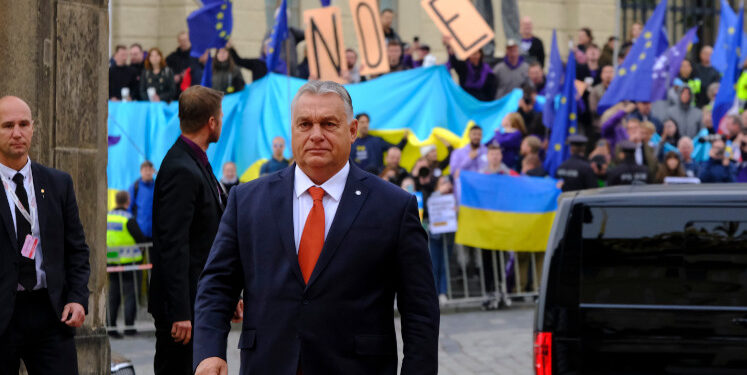The EU has long received criticism for failing to tackle democratic backsliding in its member states. Yet as Michael Blauberger and Ulrich Sedelmeier explain, there has been a marked change in approach since 2022. Brussels is now taking decisive action and there is reason to believe this shift in policy will be sustained over time.
The EU’s approach to democratic backsliding in its member states has changed markedly. After more than a decade of inaction, the EU has started to use financial penalties to sanction breaches of the rule of law, freezing €130 billion of EU funds for Hungary and Poland since 2022.
These are hardly negligible sums for the countries concerned. Unblocking EU money was one of the first priorities of the new Polish government under Prime Minister Donald Tusk. Hungary’s Prime Minister, Viktor Orbán, is also relentlessly pursuing a lifting of the EU’s sanctions – albeit by threatening to disrupt decision-making at the EU level, for instance on aid to Ukraine, instead of through credible domestic reforms.
Why the EU is taking action
What explains the EU’s policy change from inaction to enforcement? In a recent study, we argue that while the policy change culminated in the adoption of EU sanctions in 2022, its origins date back earlier. We theorise two distinct political processes, which galvanised support for EU sanctions even among political actors initially reluctant to act against democratic backsliding: a transnationalisation of the backsliding crisis and a negative intergovernmental spillover from the crisis.
First, mainstream parties across the EU have come to support sanctions against illiberal governments abroad due to domestic electoral incentives. By supporting EU sanctions, mainstream parties can distance themselves from illiberal parties at home and abroad. This distancing is particularly important for mainstream parties who maintained close relations with backsliding governments in the past but fear electoral punishment once their allies abroad have become domestically toxic.
An important precondition for this development is that democratic backsliding abroad has achieved public salience and is met with public disapproval across the other EU member states. We find that democratic backsliding in Hungary and Poland has indeed received increasing public attention and disapproval across EU member states. This transnationalisation of the backsliding crisis explains the shift in position of former partisan allies to support EU sanctions against backsliding governments abroad (as in the case of German conservatives distancing themselves from Fidesz in Hungary).
Second, even previously hesitant governments started to support EU sanctions in response to the disruptions of EU policy-making caused by backsliding governments. Initially, the Hungarian and Polish backsliding governments had been careful to remain seen as reliable cooperation partners at the EU level. In return, EU decision-makers, in particular other governments in the Council, hesitated to enforce EU values against backsliders for fear of jeopardising intergovernmental cooperation.
However, the Hungarian and Polish governments gradually abandoned their restraint and increasingly disrupted core EU policies. Hungarian obstruction of EU sanctions against Russia and of EU aid for Ukraine have become the most conspicuous instances of policy disruption.
Notably, however, they already started to occur long before the Russian war against Ukraine, for instance by undermining EU responses to the 2015 refugee crisis, threatening to block the EU’s multi-annual budget during the COVID-19 pandemic, challenging the supremacy of EU law, and alliance-building with illiberal leaders abroad. The timing helps to explain why the Council adopted the EU budget conditionality regulation as early as December 2000.
Will the EU stay the course?
Taken together, these two processes – the transnationalisation of the backsliding crisis and negative intergovernmental spillover from the backsliding crisis – explain the EU’s shift from inaction towards enforcement. But how sustainable is that policy change?
Sceptical voices point to worrying signs that the EU has not escaped its “autocracy trap” for good. The Commission’s decision to release €10.2 billion of cohesion funds for Hungary days before the European Council in December 2023 might have set a “Faustian” precedent that suggests that Viktor Orbán’s blackmail strategy through veto threats worked. Similarly, there were signs the EU was normalising, rather than eschewing, cooperation with illiberal parties prior to the 2024 European Parliament elections.
Yet, the two strands of our argument provide reasons for a more cautiously optimistic interpretation. First, at least so far, disrupting EU policy-making has hardly paid off for the backsliding governments. Instead, it has intensified frustration at the EU level.
The Commission’s unsuccessful strategy of submitting to Viktor Orbán’s veto threats in December 2023 might be remembered as just that: a salutary warning that the EU cannot be successful in the longer run if it makes itself vulnerable to blackmail and thereby encourages further policy disruptions. At the European Council in January 2024, EU leaders seem to have drawn precisely that lesson by exploring alternative options to decrease their own vulnerability to Hungarian veto threats and by successfully increasing pressure on Hungary.
Second, although illiberal parties considerably increased their support in the 2024 European Parliament elections, their electoral gains do not automatically translate into the European Parliament taking a weaker stance against democratic backsliding. Ad hoc voting coalitions between mainstream and illiberal parties already exist in the European Parliament and there is reason to think they might become more frequent, for instance to weaken EU legislation on the “Green Deal”.
It is less likely, however, that such policy collaboration among European Parliament party groups would extend to attempts to undermine EU sanctions against backsliding. In doing so, mainstream parties would risk alienating their domestic constituencies, who have become aware, and largely disapprove, of backsliding abroad. Mainstream parties therefore continue to have an incentive to support EU sanctions against backsliders to demonstrate their distance – an incentive that might even increase in the face of a strong and vocal illiberal minority in the European Parliament.
In sum, future EU action against democratic backsliding is not determined by structural conditions: there is considerable room for agency. Depending on the lessons EU leaders draw from 15 years of democratic backsliding in the EU, they may well resist the temptation to compromise EU enforcement of liberal democratic values for short-term policy agreement in the Council or the European Parliament.
For more information, see the authors’ accompanying paper in the Journal of European Public Policy
Note: This article gives the views of the authors, not the position of EUROPP – European Politics and Policy or the London School of Economics. Featured image credit: Alexandros Michailidis / Shutterstock.com







































Discussion about this post